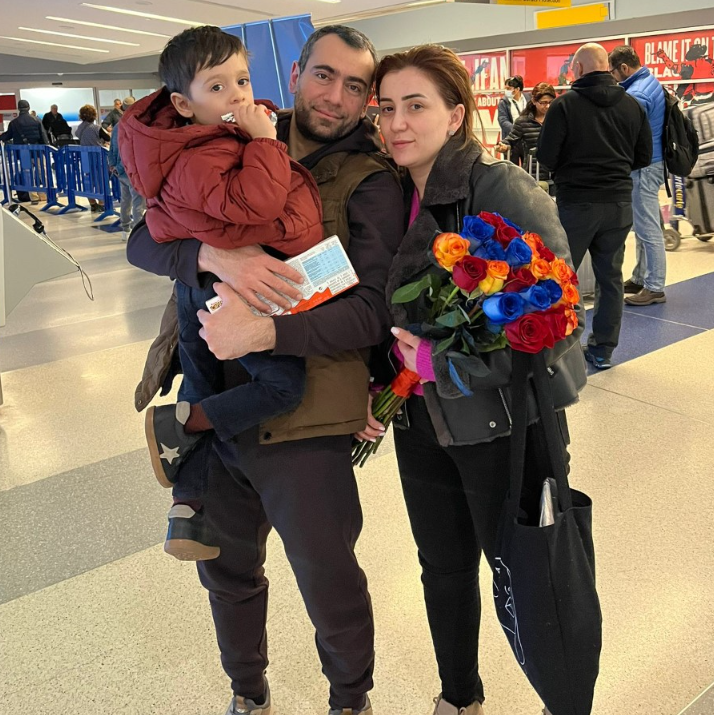
Andranik Akopyan, a first-generation Armenian from Queens, New York, turned three years old under blockade in Artsakh.
The toddler was happy to celebrate his birthday with relatives in Stepanakert. But his mother Lusine, with whom he had been in the capital of Artsakh for weeks, felt the severity of their reality.
“The entire world was celebrating the New Year, and Artsakh was stuck in the cold,” Lusine shared in an exclusive interview with the Weekly. “It was terrible. We dressed warmly and sat at home, like everyone else.”
Lusine and her son traveled to Artsakh on December 4, 2022 to see her father’s gravestone and visit their relatives for the holidays. Her husband Garegin planned to join them soon to celebrate their son’s birthday as a family.
However, on December 12, Azerbaijani activists, with the support of their government, shut down the Lachin Corridor, the sole route connecting Artsakh with Armenia and the rest of the world. The Akopyans, along with the 120,000 residents of Artsakh, were trapped. They had little food or medicine, as the usual daily import of 400 tons of basic supplies from Armenia came to a halt. They also had no means of heating their home, due to repeated obstructions to the gas and electricity supply and internet connection, which Artsakh authorities blame on Azerbaijan.
Lusine could not speak to her husband every day because of the disrupted internet access. Garegin would set alarms throughout the night and try to call them in case the internet connection was restored.
“It is heroic to live in Artsakh under those conditions in the 21st century,” Lusine said. “The conditions the population lives in. It doesn’t make sense.”
Lusine was born in Stepanakert and moved to the United States when she married Garegin in 2005. The family lives in Rego Park, Queens but visits Artsakh often. Garegin says the family continued to visit Artsakh after the war between Armenia and Azerbaijan in 2020 in defiance of Azerbaijan and Turkey’s plan to “minimize the Armenian community all over the world to visit Artsakh.”
“These days, Artsakh needs Armenian community members to go more often and support,” Garegin said. “We want everyone who would love to cut the Armenian community off from Artsakh to know that it’s not going to happen. Armenians went, are and will visit Artsakh.”
When Garegin received news of the blockade, he contacted his district’s representative in the New York State Assembly, Andrew Hevesi, whose office put him in touch with Congresswoman Grace Meng (D-NY). Meng’s office worked with the US State Department and the Armenian National Committee of America (ANCA) to evacuate the Akopyans from Artsakh.
“This family lives in Queens in Rego Park in the heart of my district. It’s our primary job to help constituents with these types of cases,” Congresswoman Meng told the Weekly in a recent interview. “This case was a bit more complicated than the usual, obviously having to deal with other organizations. We don’t have a presence on the ground in Artsakh, so my staff had to be the go-between working with these organizations.”
Congresswoman Meng, who represents New York’s 6th Congressional District in Queens, says she has been in regular contact with her constituents about the ongoing blockade of Artsakh.
“When we heard this is a local real-life family that has been affected by the blockade, we wanted to make sure we did whatever we could to make sure she and her son are safe and were able to come back home to New York,” Congresswoman Meng said.
Helping my constituents, no matter where they are in the world, is always my top priority.
I am proud to have helped in the evacuation of a constituent’s wife and son who were trapped in Nagorno-Karabakh (#Artsakh) due to the blockade of the #LachinCorridor. pic.twitter.com/zuXhVyS9IR
— Grace Meng (@RepGraceMeng) February 1, 2023
On January 26, Lusine got notice from the International Committee of the Red Cross (ICRC) that she and her son would be transported to Armenia.
The ICRC and the Russian peacekeeping mission in Artsakh are the only bodies that have been permitted to pass through the Lachin Corridor since its closure on December 12. The ICRC has transported 113 patients from Artsakh to Armenia, since all surgeries have been temporarily suspended in Artsakh due to the blockade. Lusine says the US Embassy sent a letter to the ICRC to hasten their evacuation.
The next day, nearly two months after their arrival in Artsakh, Lusine and Andranik landed at John F. Kennedy International Airport in Queens.
Congresswoman Meng is one of over 60 US representatives supporting a congressional resolution (H.Res.108) to condemn the blockade of Artsakh by Azerbaijan. The resolution calls for international investigations into Azerbaijani war crimes, suspension of US military assistance to Azerbaijan and sanctions against Azerbaijani officials, among other measures.
“Symbolically, it’s important we have a resolution like that condemning the blockade,” Congresswoman Meng said. “This resolution, which is bipartisan, is important because not only does it confirm our stance as Congressmembers, but in a more public way, allows the rest of the world, who might not know what’s going on over there, to make sure that people understand what a dire circumstance this is for people.”
During the Weekly’s interview with the Akopyan family, Andranik interrupted his father with a laugh. Garegin, who had been warning that the Armenian Diaspora must take unified action to support Artsakh, paused to smile.
“I’m glad Armenia’s kids can still laugh, but I want them to laugh in their historical motherland as well,” Garegin said.



We must do everything we can to keep our compatriots employed in Artsakh so that they will not emigrate to foreign lands!